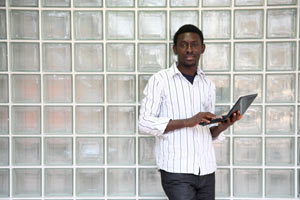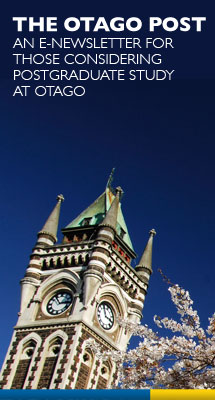 Friday 11 March 2016 11:22am
Friday 11 March 2016 11:22am
Femi Aderohunmu
PhD candidate, Information Science
Information Science Masters student Femi Aderohunmu had always been interested in a higher degree, but it wasn't until he met a New Zealander that he considered Otago as a place for his postgraduate study. Now the Nigerian-born student has started his PhD, and credits Otago with helping to make the future he wanted for himself possible.
“I saw ahead because I stood on the shoulders of giants!” says Femi. “Thanks to the University of Otago, and most especially to my supervisors.”
After Femi graduated with First Class Honours from the Department of Mathematics and Computer Science at the University for Development Studies in Ghana he worked for a telecommunications company in Nigeria, but always held dreams of pursuing a PhD. He found out about the Department of Information Science's programme in telecommunications, applied for — and was granted — an Otago International Masters Award. This helped him make the big step into postgraduate study.
Femi's research focuses on energy management techniques for protocol designs in wireless sensor networks, or WSNs.
“WSNs are networks of lightweight, battery-powered sensors, used mainly for monitoring purposes,” explains Femi. “One of the numerous advantages of these sensors is their ability to operate unattended, which makes them ideal for inaccessible areas.”
“The applications of these sensors are only limited by our imagination. For example, with climate being a topical issue currently, WSNs can be utilised to gather environmental variables such as temperature, humidity and pressure. Sensor networks can also be deployed in tsunami and earthquake-prone areas, in hospitals for patient monitoring, in the military for battle field surveillance and so on.”
“However, while WSNs are increasingly equipped to handle more complex functions, in-network processing such as data aggregation, information fusion, computation and transmission requires them to use their energy efficiently — since they are battery-powered — in order to extend their effective network lifetime. My research goal was to design an energy heterogeneous-aware protocol that is robust and can ensure longer network lifetime compared with existing schemes.”
Having concluded his Masters degree, Femi is continuing on to a PhD at Otago under the supervision of Professor Martin Purvis and Dr Jeremiah Deng, and with the help of an Otago Postgraduate Scholarship.
“Studying at Otago has really exceeded my expectations,” says Femi. “The supervision is fantastic and the training you go through as a postgraduate student gives you confidence in your area of specialty.”
Eventually Femi hopes to work for the United Nations' Office of Information and Communications Technology, which he hopes will one day take him back to Africa to be involved with the Bridging the Digital Divide campaign and the implementation of the ICT New Millennium Development goal 2020 for Africa.
“When people ask me what motivates me, I tell them it is the challenges that I face in my research. I want to break boundaries and this keeps me moving on. As Albert Einstein put it: 'if we knew what it was we are doing, it won't be called research; would it?' I motivate myself with those lines.”
To find about more about Information Science at Otago, visit www.business.otago.ac.nz/infoscience/

